Analysis by Keith Rankin.
Covid has a habit of biting us on the bum, just as key milestones seem to be behind us. A diverse range of countries are facing current setbacks: eg Chile, Colombia, Bulgaria (where one in a hundred people have died from Covid), Hong Kong, South Korea, Israel. In Ukraine, there have been 210,000 excess deaths in the time of Covid; that’s one in two hundred people having died from covid. In Russia it’s been even worse, much worse.
On 11 February, with a sense of optimism, I published these charts on Denmark and Israel. So far Denmark is keeping its deaths from covid this year in check (see end of this chart commentary), though it may be mainly through increased natural immunity arising from the late 2021 delta-covid outbreak.
Israel
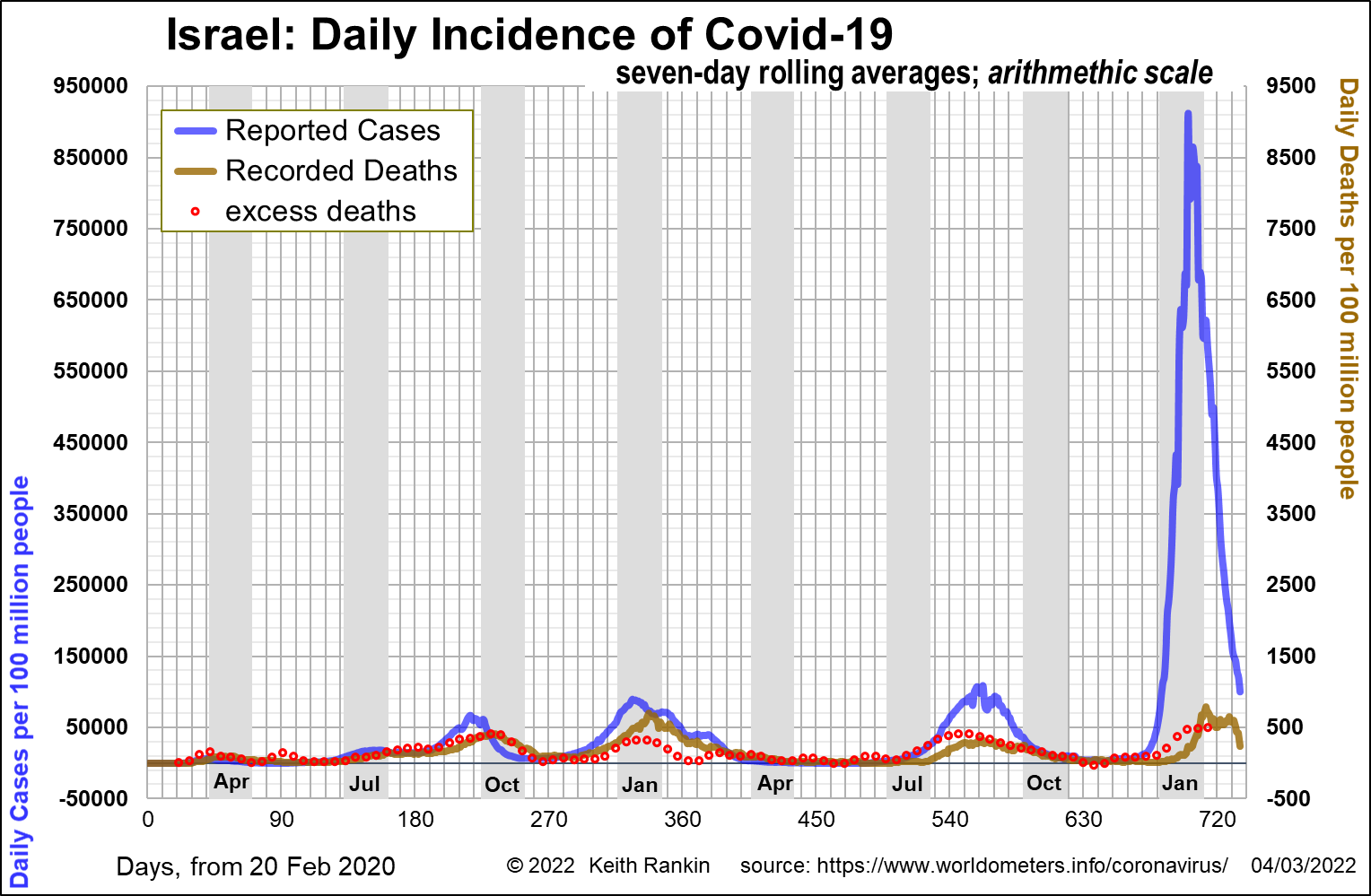
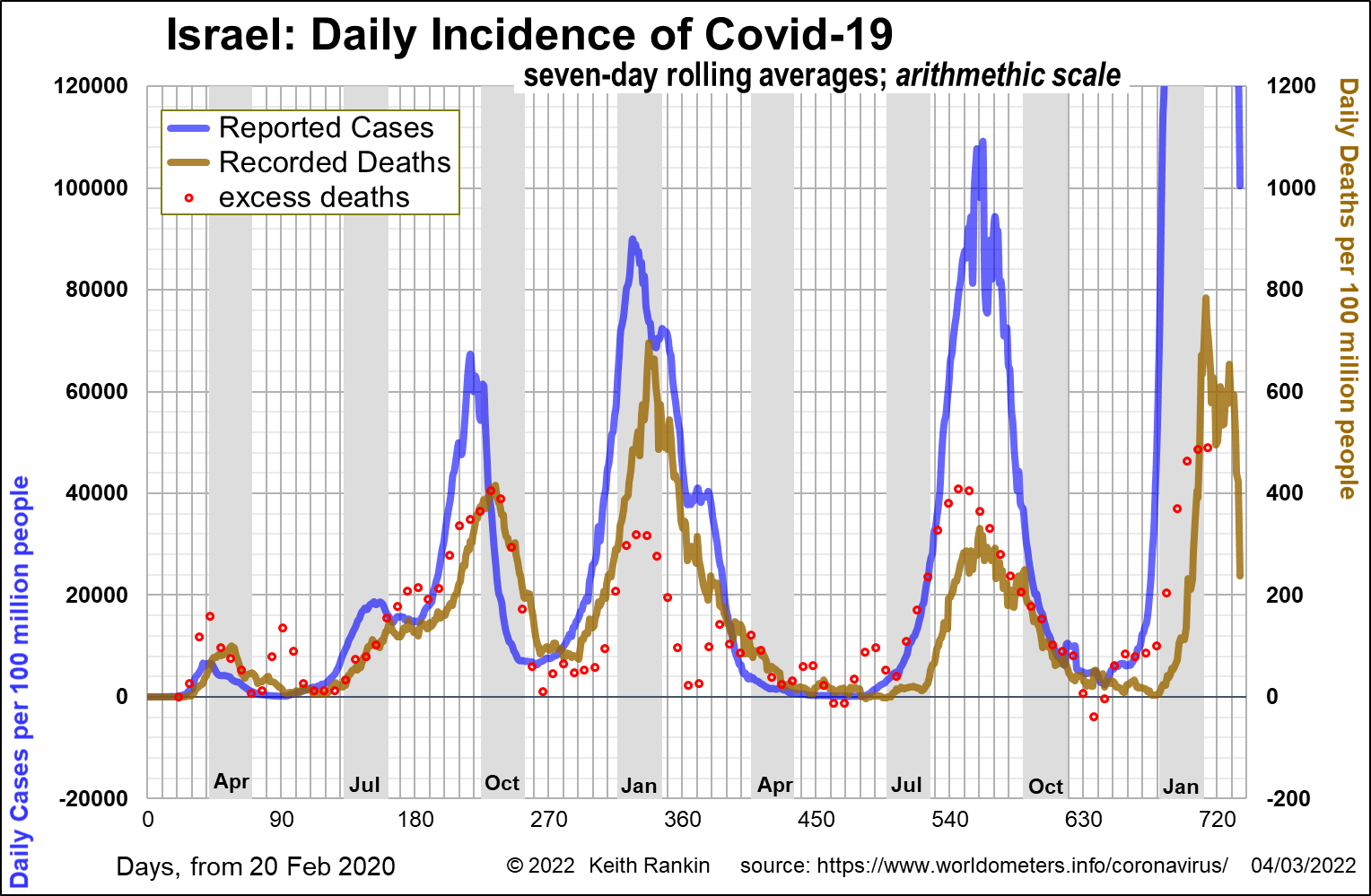
Israel has been a problem. Indeed, just after I published those Israel charts, the January 2022 weekly death tallies were revised upwards, substantially. Israel is of particular concern, especially to me; many of its older and other more vulnerable people received a fourth dose of the Pfizer vaccine. Because Israel did not participate in Europe’s huge November delta-covid outbreak, its population’s natural immunity had waned more than that of Denmark’s people. What may have happened in Israel, in addition to waning natural immunity, is a substantial amount of comorbidity arising from earlier covid waves; comorbidity that I have generally called ‘post-covid’ (distinct from long-covid, though there may be an overlap).
Israel had the biggest ever recorded peak of omicron-covid, with Denmark in second place. The charts above show excess deaths rising sharply in early January, ahead of the ‘official’ covid death toll, though after the rising case data. While excess deaths will peak lower than the official ‘deaths with covid’ toll, it is nevertheless substantial; indeed it is Israel’s highest excess-death episode in the whole covid pandemic.
Before we ascribe Israel’s current toll to omicron-covid, it is important to note that, in the last two weeks of December, forty percent of Israel’s sequenced covid-cases were the delta variant; and, in the first two weeks of January, seven percent of such cases were delta-covid. (Seven percent of cases was still a very large number, given that the denominator – total cases – was rising so quickly.) So, it’s entirely possible that Israel’s January covid-death-surge was principally – or even entirely – due to delta-covid rather than omicron-covid.
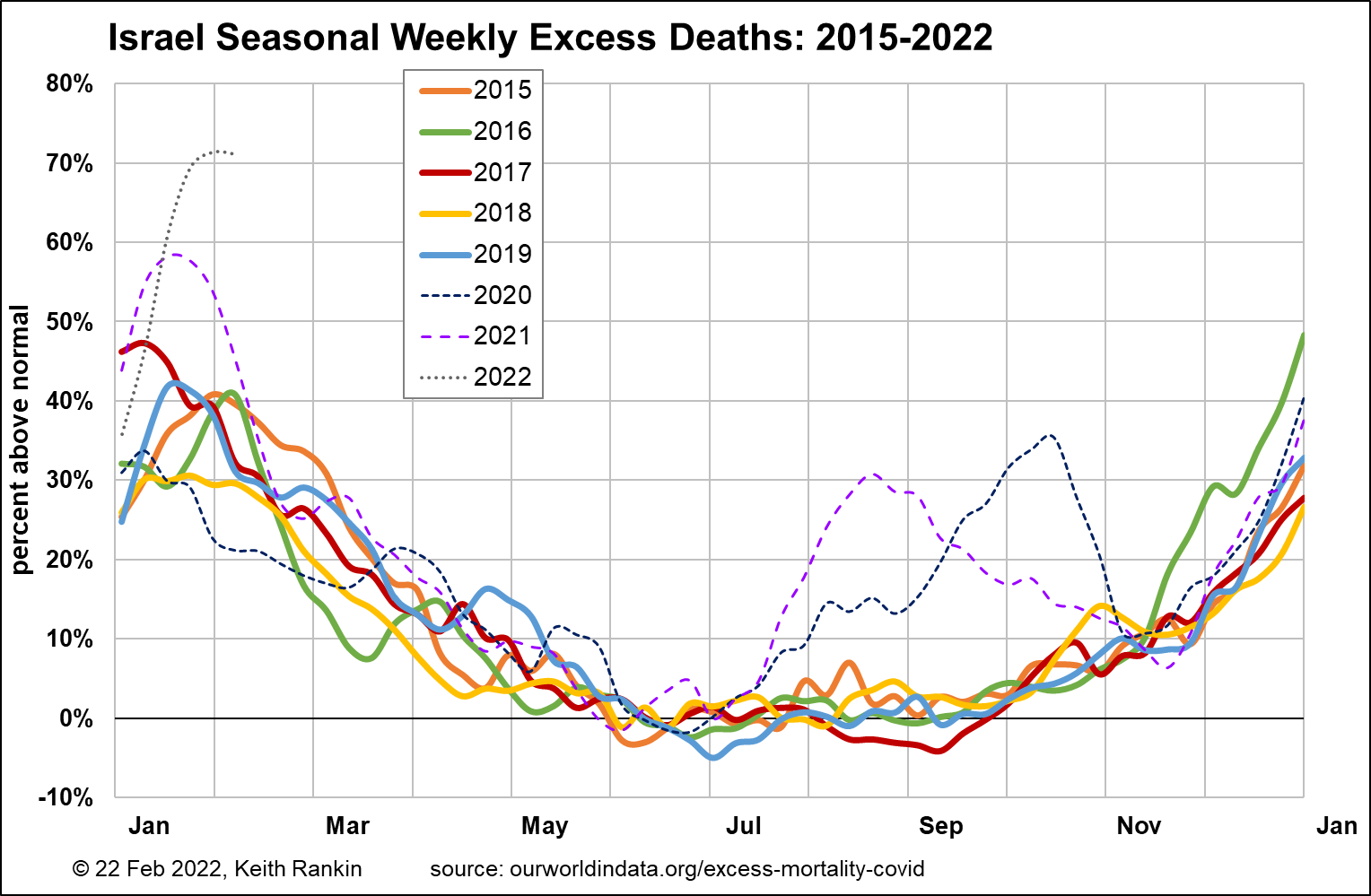
In this final chart for Israel, we see the January seasonal death peak substantially exceeding the January 2021 peak, which in turn exceeded the January 2017 influenza (pandemic in all but WHO designation) seasonal mortality peak. (Next week I will try to get some information on the age profile of Israel’s latest covid victims.)
New Zealand
While we cannot translate the experience of one country directly onto another, these Israel data give me a distinctly uneasy feeling about what could happen in Aotearoa New Zealand this winter. It is important to note that New Zealand has been one of the world’s major delta hold-outs. Further, in Bulgaria where seasonal deaths are also surging, there are signs that delta-covid has been regaining the upper hand, over omicron.
Compared to Israel, which clearly has post-covid comorbidity, New Zealand’s vulnerability will be in the immunological naivety of the people who are currently taking all steps possible to avoid getting covid now. And, while I will certainly be a taker for another immunisation booster in June – and the government of New Zealand should be promising, now, that fourth doses will be available from May for certain segments of the population – we sense from Israel that vaccinations (especially Pfizer vaccinations) are reaching a point of diminishing returns.
Waning immunity has always been a known problem with respect to coronaviruses. Our community of experts has let us down by not telling us this (or, even worse, by not knowing this).
South Korea
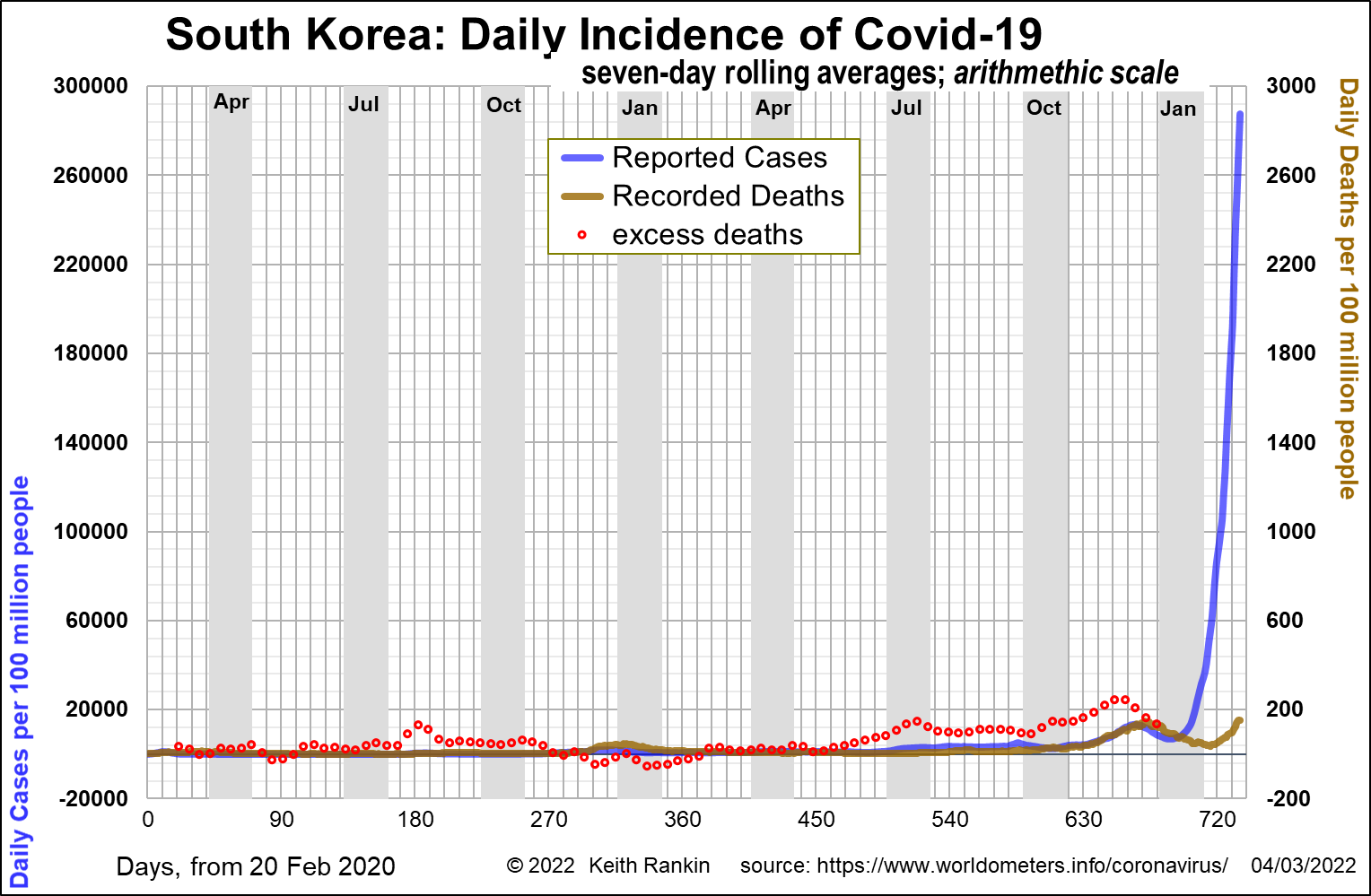
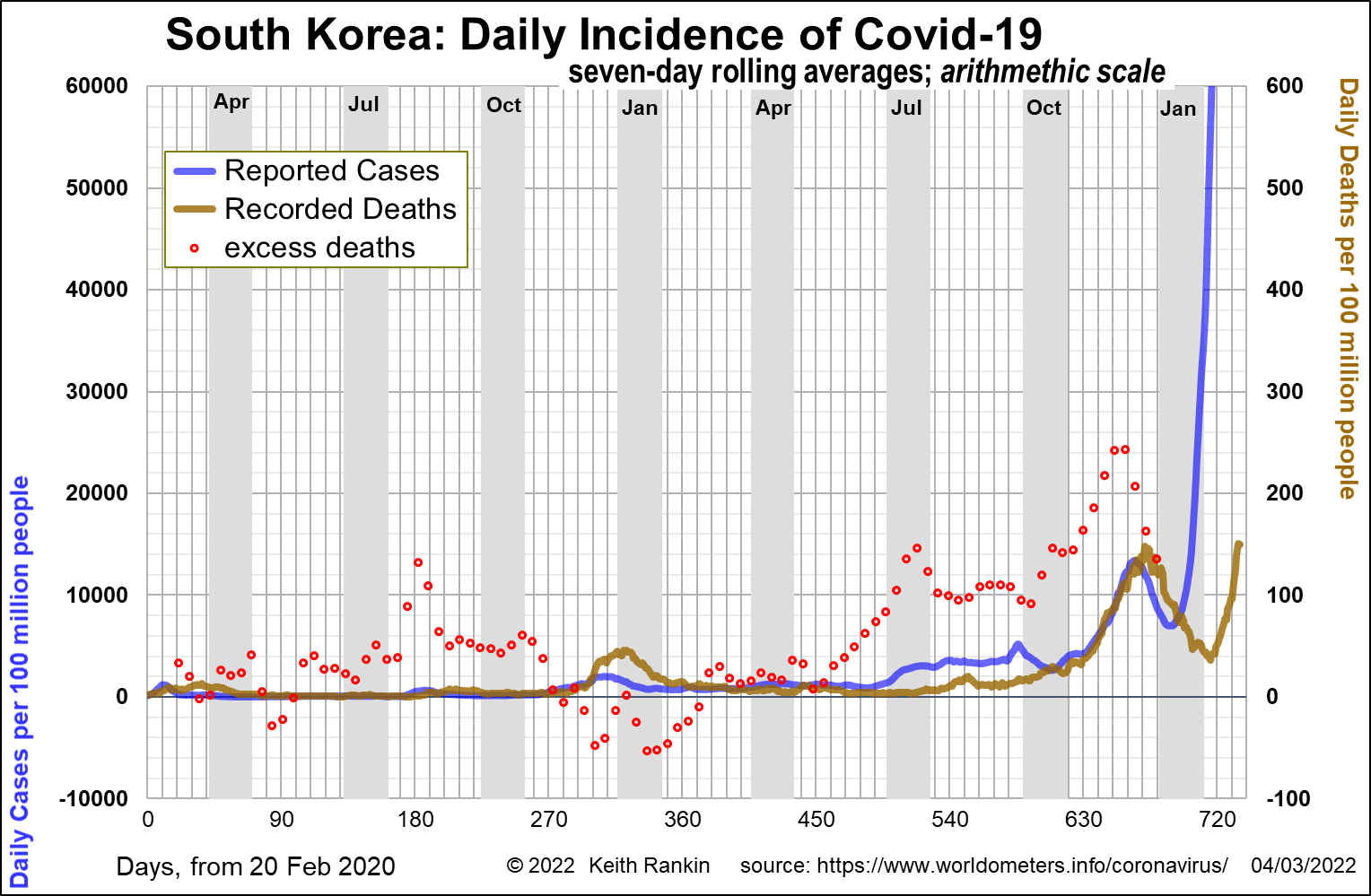
South Korea is presently having a nasty run of Covid19, and with its presidential election coming up next week. The Korean covid news has been obscured by the war in Ukraine. (It is important to note, however, that the scale of covid in Korea is still significantly less than the scale in Israel; look at the numbers on the left- and right-hand sides of the charts. The scale in Israel in turn is much less than in Eastern Europe. At the end of November, Bulgaria’s toll was ten times greater than Israel’s.)
South Korea is one of those countries which is frustratingly slow in releasing its ‘total deaths’ data. The Economist, which maintains a set of current and historical estimates for excess deaths for all countries, has had extreme trouble trying to read South Korea’s current situation. (Russia and Ukraine have been more cooperative in releasing their basic demographic data. And Bulgaria, Peru and Chile release their data almost in real time. There is no excuse for first world countries being so tardy in making known their aggregate death totals.)
What we do know is that actual covid deaths in South Korea in the latter part of 2022 were much higher than official covid death numbers; with the actual peak in early December earlier than the acknowledged peak in late December. The new February acknowledged death peak is as high as the acknowledged December peak, though we don’t know the extent to which the latest deaths are with covid but not of covid. Denmark – see chart below – has substantial numbers of deaths that are with covid but not of covid.)
Like Israel in December, Korea still had substantial numbers of delta-covid infections in January. So, as for Israel, the Korean experience may be mainly delta-covid masquerading as omicron-covid.
Denmark – chart only
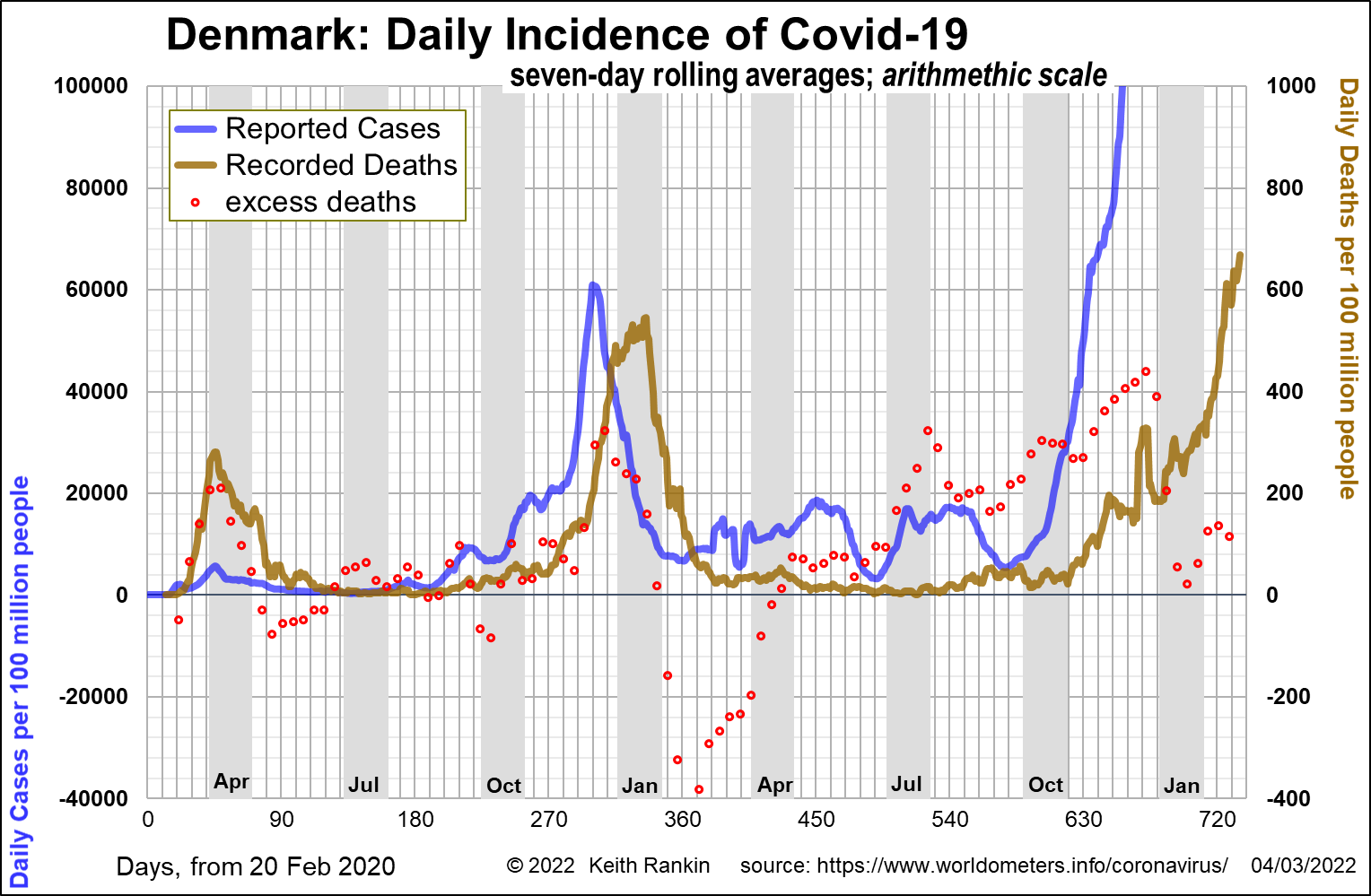
New Zealand again, and East Asia
East Asia is becoming the next major region of concern. It’s (with Southeast Asia and New Zealand) the major delta holdout. That includes Hong Kong, which is also experiencing a deadly covid wave. What is happening in Hong Kong and South Korea today will probably also happen in China and Taiwan this year. While we may expect China to release its covid-mandate-stranglehold this month, in acknowledgement of global reality, we may expect little admission of this from China when it happens.
Can New Zealand indefinitely keep its covid and post covid deaths down below the levels of all other countries bar China? Probably not. Rather than hiding such a reality, as China most likely will, we must expect a plethora of spinful excuses when a rising death toll from respiratory viruses eventually brings New Zealand into closer alignment with the rest of the human community.
Epidemiologist Michael Baker (Coronavirus: New Zealand’s response still one of the best worldwide – Michael Baker, Newshub, 28 Feb 2022) has tried to make much of New Zealand’s alleged increase in life expectancy. Sadly for us, the recent historical mortality data used to make this calculation cannot be used like this to make ‘expectancy’ predictions for deferred mortality.
Dr Baker reportedly said “the outbreak will peak over the next month before declining”. He also reportedly said “we have what is called peak immunity”. So, he believes that covid’s peak will coincide with the population’s peak immunity! Some of us in New Zealand are concerned that covid will be more prevalent in the winter when there is less immunity, and not in March when there is more immunity.
Some attention to overseas data suggests that a country’s covid experience in the first stages of a coronavirus pandemic may not be a good predictor of subsequent outcomes.
*******
Keith Rankin (keith at rankin dot nz), trained as an economic historian, is a retired lecturer in Economics and Statistics. He lives in Auckland, New Zealand.




